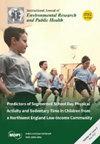探索污名对健康和幸福的影响:有获得康复服务亲身经历的母亲的见解
3区 综合性期刊
Q1 Medicine
International Journal of Environmental Research and Public Health
Pub Date : 2024-09-06
DOI:10.3390/ijerph21091189
引用次数: 0
摘要
污名化是指一个人因其属性、特征和/或行为而被贬低的过程,这往往会导致偏见、社会和健康方面的伤害、主动歧视和微观诽谤。本文旨在说明社会伤害是如何发生的,以及成见是如何损害康复者的健康和福祉的。为此,我们将重点放在吸毒母亲在积极康复期间在治疗和康复环境中遇到的标签内化所产生的危害,以及这种污名化如何表现出消极的自我信念。定性数据来自两个半结构化焦点小组,参与者包括有吸毒经历的女性(n = 13)。我们采用了反思性主题分析方法来分析访谈记录,并确定了三个主题:(1) 成见的持久性;(2) 性别差异以及母亲和女性专用空间的必要性;(3) 成见是获得服务和福祉的障碍。研究结果表明,在积极康复的母亲中,成见具有持久性,女性比男性更容易受到严厉的评判,而且在康复过程中,她们还面临着成为 "好母亲 "的压力。本文表明,处于康复期的母亲仍然受到污名化,因此,她们在接受服务时会更加敏感,污名化往往导致她们脱离或不愿接受医疗服务。我们的结论是,医疗、社会和初级保健机构的工作人员需要与康复中的母亲建立牢固的治疗联盟,并在实践中推广反污名化方法,以减轻污名化,减少对健康和福祉的伤害。本文章由计算机程序翻译,如有差异,请以英文原文为准。
Exploring the Impact of Stigma on Health and Wellbeing: Insights from Mothers with Lived Experience Accessing Recovery Services
Stigmatisation is the process by which an individual is devalued based on their attributes, characteristics, and/or behaviour, with this often leading to prejudice, social and health-related harms, active discrimination, and microaggressions. The aim of this paper is to show how social harms can occur and how stigma is damaging to the health and wellbeing of a person in recovery. To do so, we focus on the harms that arise from the internalisation of labels that mothers who use drugs encounter in a treatment and recovery setting whilst in active recovery, and how this stigmatisation can manifest negative self-beliefs. Qualitative data was used from two semi-structured focus groups involving females with lived experience of substance use (n = 13). A reflexive thematic analysis approach was used to analyse the interview transcripts, and three themes were identified: (1) the enduring nature of stigma; (2) gender disparity and the need for mothers- and women-only spaces; and (3) stigma as a barrier to services and wellbeing. Findings revealed the enduring nature of stigma amongst mothers who were in active recovery, with women feeling judged more harshly than men and experiencing pressure to live up to a “good mother” ideal whilst in recovery. This paper demonstrates that mothers in recovery are still stigmatised and, as a consequence, approach services with increased sensitivity, with stigma often resulting in disengagement or reluctance to access healthcare settings. We conclude that staff in health, social, and primary care settings need to develop a strong therapeutic alliance with mothers in recovery and promote anti-stigma approaches in their practice, in order to mitigate stigma and reduce harms to health and wellbeing.
求助全文
通过发布文献求助,成功后即可免费获取论文全文。
去求助
来源期刊

International Journal of Environmental Research and Public Health
Medicine-Public Health, Environmental and Occupational Health
CiteScore
7.30
自引率
0.00%
发文量
14422
审稿时长
1 months
期刊介绍:
International Journal of Environmental Research and Public Health (IJERPH) (ISSN 1660-4601) is a peer-reviewed scientific journal that publishes original articles, critical reviews, research notes, and short communications in the interdisciplinary area of environmental health sciences and public health. It links several scientific disciplines including biology, biochemistry, biotechnology, cellular and molecular biology, chemistry, computer science, ecology, engineering, epidemiology, genetics, immunology, microbiology, oncology, pathology, pharmacology, and toxicology, in an integrated fashion, to address critical issues related to environmental quality and public health. Therefore, IJERPH focuses on the publication of scientific and technical information on the impacts of natural phenomena and anthropogenic factors on the quality of our environment, the interrelationships between environmental health and the quality of life, as well as the socio-cultural, political, economic, and legal considerations related to environmental stewardship and public health.
The 2018 IJERPH Outstanding Reviewer Award has been launched! This award acknowledge those who have generously dedicated their time to review manuscripts submitted to IJERPH. See full details at http://www.mdpi.com/journal/ijerph/awards.
 求助内容:
求助内容: 应助结果提醒方式:
应助结果提醒方式:


